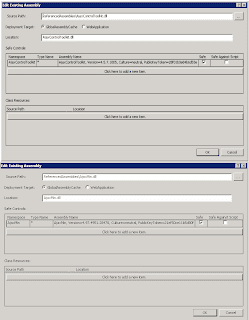CRM 2011 Auto-populate Name from Fields or Attributes
Are you tired of thinking about what to put into the name field when creating records and want a way to populate that name automatically?
I have created a service extension method to make my life easier. The goal of this is to autopopulate name field using the format like [field1] - [field2] - [field3] through pre-plugin:
To use this you just need to construct the column set and pass in the entity from the plugin context:
We also need a javascript to disable this name field when the form load:
Hope this helps,
Andreas
I have created a service extension method to make my life easier. The goal of this is to autopopulate name field using the format like [field1] - [field2] - [field3] through pre-plugin:
To use this you just need to construct the column set and pass in the entity from the plugin context:
We also need a javascript to disable this name field when the form load:
Hope this helps,
Andreas

Comments
Post a Comment